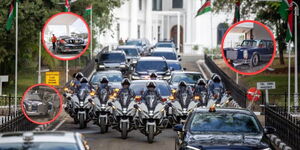The Supreme Court on Monday, September 5, upheld the victory of the president-elect, William Ruto in the August 9 polls.
While delivering their judgment at Milimani Law Courts, the seven-judge bench ruled on nine contentious issues highlighting issues such as the credibility of the Independent Electoral and Boundaries Commission (IEBC), whether Ruto attained 50 per cent + one vote among others.
Chief Justice Martha Koome, while delivering the judgement, affirmed that the decision was unanimously agreed upon by the seven-judge bench.
Here is a summary of the ruling by the Supreme Court of Kenya:
Determinations
1: Whether the technology deployed by IEBC for the 2022 General Election met the standards of integrity, verifiability, security and transparency to guarantee accurate and verifiable results
Verdict: Dismissed
The apex court ruled that the scrutiny report by the Judiciary did not reveal any security breaches as purported in the presidential petition.
"We are not persuaded that IEBC technology failed the test on verifiability, transparency. The Kiems Kit passed the simplicity, reliability, Integrity, verifiability and security test during August 9th, 2022 presidential election in Kenya."
2. Whether there was interference with the uploading and transmission of Forms 34A from the polling stations to the IEBC public portal?
Verdict: Dismissed
The seven-judge bench ruled that the evidence and logs provided in the petition were either outrightly forged or were obtained from the 2017 General Election.
The Justices noted that the scrutiny report by the Judiciary showed that the original Forms 34A were the same as the ones uploaded in the IEBC portal.
"The allegations that 11,000 forms were affected were not true. During the ICT scrutiny, the original Forms 34A which were allegedly intercepted were the same and certified. "
"The allegation that IEBC used a tool to tamper with forms 34 A was sufficiently explained when IEBC demonstrated how KIEMS captured and transmitted the image," CJ Koome ruled.
3. Whether there was a difference between Forms 34A uploaded on IEBC public portal and Forms34 A received at the national tallying centre and Forms 34 A issued to agents at polling stations?
Verdict: Dismissed
The apex court dismissed the affidavits filed by Arnold Odinga and Celestine Opondo showed different Forms 34A from the ones on the IEBC portal.
Further, John Githongo's affidavits were also dismissed as they lacked admissible evidence.
"The report confirmed the authenticity of the reports uploaded on the IEBC public portal. The forms 34A attached to those affidavits by Arnold Odinga and Celestine Opondo and purportedly given to them by agents were significantly different from those on the public portal. It has been established that none of the agents swore any affidavits," CJ Koome stated.
On the part of Venezuelan Jose Carmago, who was purported to have gained entry into the IEBC server to manipulate the results, the Supreme Court termed the claims as "hot air."
4. Postponement of elections:
Verdict: Dismissed
The Supreme Court ruled that the petitioners did not show enough evidence that the electoral commission acted in bad faith in postponing the elections.
"Supreme Court finds that the IEBC chairperson had jurisdictions to postpone elections in the 8 electoral areas and that it never resulted to voter suppression."
"It's not been shown that by postponing elections in the named electoral units IEBC acted in bad faith or was influenced by relevant factors and considerations. We are satisfied that the postponement was occasioned by a genuine mistake."
5. Whether there were discrepancies between votes casts for presidential candidates and other elective positions.
Verdict: Dismissed
The apex court ruled that the Azimio la Umoja coalition did not provide sufficient evidence to prove the discrepancies were as a result of fraud.
"The main Petitioner did not prove his allegation that discrepancies between votes cast for presidential candidates and other positions were as a result of fraud. Hence the discrepancy can not lead to nullification."
6. Whether IEBC carried out verification tallying and declaration of results in accordance with the provisions of Article 138 (3c) and Article 138 (10) of the Constitution.
Verdict: Dismissed
CJ Koome highlighted contentious issues within the electoral commission that ought to be ironed out. The apex court however ruled that the court could not nullify the election based on internal differences and disputes.
"IEBC needs far-reaching reforms. However, are we to nullify an election because of a last-minute boardroom rapture? This we cannot do."
"All the petitioners contend that the walkout by the four commissioners called to question the credibility of the entire election. We note that apart from their 11th-hour denunciation there is no proof that the election was compromised," Koome ruled.
7. Whether Ruto, the declared president-elect attained 50 per cent +1 in accordance with Article 138 (4) of the Constitution.
Verdict: Dismissed
The Supreme Court determined that Ruto met the 50 per cent plus 1 vote as stipulated in the 2010 Constitution of Kenya.
"We have found that the rounding off done by IEBC is correct. The petitioners did not also provide watertight evidence to show that none of the candidates met the 50 plus 1 requirement."
8. Whether there were irregularities of such magnitude as to affect the final results of the presidential election.
Verdict: Dismissed
The apex court ruled that the irregularities and illegalities were not sufficient to compel the court to nullify the election.
9. Other reliefs and orders the court can issue.
Verdict: Dismissed
The apex court dismissed the petitions, with each party bearing its costs. The judgment was unanimous.
"Expect recommendations addressing the minor failures of IEBC in the long-form judgment.
Final Orders of the court:
"The presidential election petitions by Raila and six others are hereby dismissed. Thus we declare the elections of the first respondent to be valid. We order that each party bear their own cost," Koome ruled.












